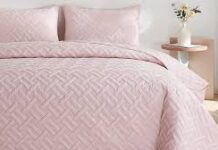Vinyl flooring has become popular for homeowners, designers, and contractors alike thanks to its versatility, durability, and broad design alternatives. Whether renovating your home or regarding new flooring for a commercial space, vinyl flooring proposes diverse advantages that make it a compelling choice. We will explore the many facets of vinyl flooring, from its types and benefits to installation and maintenance. If you want vinyl flooring, contact California Flooring and Design for a free home estimate.
Types of Vinyl Flooring
Vinyl flooring arrives in diverse types, each with its unique characteristics and suitable applications.
- Vinyl Sheet Flooring: Vinyl sheets are large, continuous rolls of flooring material. They are known in diverse designs and patterns and are well-suited for zones with heavy foot traffic, such as commercial spaces. Vinyl sheet flooring is cost-effective and relatively easy to install.
- Vinyl Plank Flooring: Vinyl plank flooring mimics the countenance of hardwood flooring with realistic wood grain patterns. It offers hardwood’s aesthetic appeal while providing vinyl’s durability and moisture resistance. Vinyl plank flooring is excellent for residential spaces like living rooms and bedrooms.
- Vinyl Tile Flooring: Vinyl tiles replicate the appearance of ceramic or stone tiles. They come in various sizes, shapes, and colors, allowing for creative design possibilities. Vinyl tile flooring is moisture-resistant and suitable for kitchens, bathrooms, and entryways.
- Luxury Vinyl Tile (LVT) and Luxury Vinyl Plank (LVP): LVT and LVP are premium vinyl flooring options that provide high-end aesthetics and durability. They frequently arrive with realistic texture and embossing to mimic the countenance and feel of natural materials like wood and stone. LVT and LVP are versatile and can be utilized in residential and commercial settings.
Advantages of vinyl floorings
- Durability and Resilience
One of the paramount advantages of vinyl flooring is its durability and resilience. Vinyl is comprehended for its ability to withstand heavy wear and tear, making it suitable for high-traffic areas in homes and commercial spaces. The wear layer, a protective topcoat on vinyl flooring, enhances its resistance to scratches, stains, and scuffs. Additionally, vinyl flooring is water-resistant, making it an ideal choice for areas prone to moisture exposure, such as kitchens, bathrooms, and basements. Its resistance to moisture helps prevent issues like warping, swelling, and mold growth, which can occur with other flooring materials.
- Wide Range of Designs and Styles
Vinyl flooring offers extensive design options, allowing you to achieve the look and ambiance you desire for your space. Whether you prefer the classic elegance of hardwood, the timeless appeal of stone, or the versatility of unique patterns and colors, vinyl flooring can accommodate your aesthetic preferences. Advancements in digital printing technology have enabled manufacturers to produce vinyl flooring with incredibly realistic visuals, including natural textures and grain patterns. This means you can enjoy the appearance of authentic materials without the associated maintenance and cost.
- Easy Installation and Maintenance
Vinyl flooring is known for its ease of installation, making it a practical choice for DIY enthusiasts and professional installers. Depending on the type of vinyl flooring you choose, installation methods may include adhesive, click-and-lock systems, or loose-lay options. Vinyl’s flexibility allows for installation over various subfloor types, including concrete, plywood, and existing flooring. Maintenance is also straightforward with vinyl flooring. Regular sweeping or vacuuming and occasional damp mopping are usually all that’s needed to keep it clean. Unlike natural materials such as hardwood or stone, vinyl doesn’t require specialized cleaners or sealing treatments, saving you time and money in the long run.
- Comfort and Warmth
Vinyl flooring provides a comfortable and cozy underfoot feel, thanks to its resilient nature. It proposes a slight cushioning effect that reduces foot fatigue, making it an excellent choice for areas where people stand for extended periods, such as kitchens or retail spaces. Further, vinyl flooring becomes relatively warm in colder climates, unlike materials like tile or concrete. It remains relatively warm and comfortable, making it a popular choice for bedrooms and living areas.
- Environmentally Friendly Options
For eco-conscious consumers, there are environmentally friendly options in the vinyl flooring market. Many manufacturers produce vinyl flooring that incorporates recycled materials or adheres to sustainable manufacturing practices. Additionally, some vinyl flooring products are FloorScore certified, indicating low emissions of volatile organic compounds (VOCs), which can contribute to indoor air pollution. Recycling programs are available for vinyl flooring, allowing for responsible disposal and repurposing of old materials. When exploring vinyl flooring options, inquire about products that align with your environmental values.
Vinyl flooring is a versatile and practical option that combines style, durability, and affordability. Whether you’re looking to enhance your home’s interior or update a commercial space, vinyl flooring offers a wide range of design choices, exceptional durability, and ease of maintenance. Its resilience, water resistance, and comfortable feel underfoot make it an appealing choice for various applications. When considering your flooring options, pay attention to the advantages of vinyl floor, as it continues to gain popularity for its many benefits.
Write and Win: Participate in Creative writing Contest & International Essay Contest and win fabulous prizes.
















